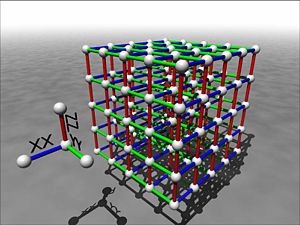Difference between revisions of "QW ("Q-Dub"): Quantum Computing Theory Group"
| Line 3: | Line 3: | ||
[[Image:Grid.jpg|center|300px]] | [[Image:Grid.jpg|center|300px]] | ||
Welcome to the [[Quantum Computing Theory Group]]. | Welcome to the [[Quantum Computing Theory Group]]. | ||
| + | |||
| + | A quantum computer is a device which computes according to the laws of quantum physics. Building such a computer offers the potential to drastically change the space of what is difficult or easy for a computing device to calculate. Most famously, a large enough quantum computer could efficiently factor numbers and hence break numerous widely used crypographic schemes. While only small scale quantum computers have been built, a worldwide community of researchers is attempting to build larger quantum computers and is exploring the consequences of viewing computing and information processing through the lens of quantum theory. | ||
| + | |||
| + | Our group studies all aspects of the quantum computing research from ideas about how to build a quantum computer to the quantum algorithms which will run on these future quantum computers. We are particularly interested in everything and anything that lies between the boundary of computer science and physics. | ||
</div> | </div> | ||
<div style="margin-left:430px"> | <div style="margin-left:430px"> | ||
Revision as of 23:02, 31 January 2008
Welcome to the Quantum Computing Theory Group.
A quantum computer is a device which computes according to the laws of quantum physics. Building such a computer offers the potential to drastically change the space of what is difficult or easy for a computing device to calculate. Most famously, a large enough quantum computer could efficiently factor numbers and hence break numerous widely used crypographic schemes. While only small scale quantum computers have been built, a worldwide community of researchers is attempting to build larger quantum computers and is exploring the consequences of viewing computing and information processing through the lens of quantum theory.
Our group studies all aspects of the quantum computing research from ideas about how to build a quantum computer to the quantum algorithms which will run on these future quantum computers. We are particularly interested in everything and anything that lies between the boundary of computer science and physics.
